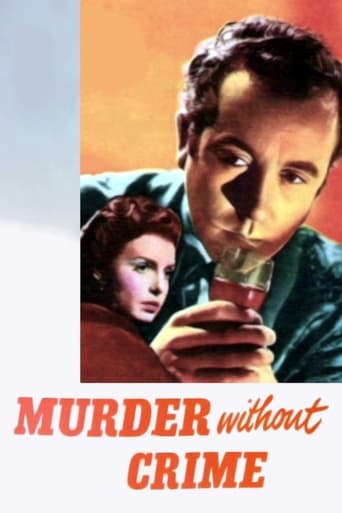drednm
Dennis Price is a landlord by necessity, that is, he is forced to rent out rooms in his West End mansion and has a bickering couple (Derek Farr and Patricia Plunkett) upstairs. They are having an argument and she decides to leave him. After she leaves, he decides to drown his sorrows at a nearby bar where he meets Grena (Joan Dowling), a tart who lives on the same block.Back at her place and very drunk, he decides he'd rather just go home, which infuriates her. She ends up following him home and they have a loud argument which turns physical and which Price downstairs can hear. Plunkett changes her mind and calls home in the middle of the mayhem. Grena has been killed.What ensues is a cat-and-mouse game as Price enters the gargoyle-filled apartment, guesses what has happened, and decides to blackmail Farr.Excellent thriller with more than a few surprises in the plot. The four actors are all excellent with Price and Dowling taking top honors. Also of note are the incredibly ugly Victorian apartment and lighting that creates a room of monstrous shadows and shapes.The opening and closing narration is a little weird, but don't let it put you off this tidy thriller.
writers_reign
The UK Forestry Commission kept the British Film industry supplied with a constant stream of wooden actors throughout the forties and fifties - Richard Todd, John Gregson, Richard Pasco, Kieron Moore, Anthony Steele, not forgetting, of course, Derek Farr who takes one of the four roles in this quasi-thriller based on a play by J. Lee Thompson and marking his directing debut. Although someone has seen fit to employ a narrator to top and tail the proceedings they have not seen fit to afford him a credit. Although Thompson 'opens it out' a tad its stage origins are evident and it relies a tad too much on legerdemain, nevertheless it does entertain and offers a glimpse of two actresses who never quite fulfilled their early promise; Patrica Plunkett more or less petered out whilst Joan Dowling committed suicide in the wake of her husband's unfaithfulness. The husband was Harry Fowler and both had found early success as child actors in Hue and Cry and though Fowler survived his wife and remarried he never fulfilled his own early promise despite appearing in several more films. Murder Without Crime remains a curio which is well worth watching.
JohnHowardReid
Slow-moving and stagey, but interesting "B" movie with arresting camera-work by Bill McLeod, plus the baroque finery of Jon Ashton's inspired art direction. Lee-Thompson's screenplay has overtones of "Rope", and one could not wish for a more ironic climax. However, 97 minutes is a little too long to spend with only four characters – especially as two of them are absent for much of the time, allowing the film to develop as a rather self-indulgent duologue. The movie is also saddled with an ill-advised and utterly phoney Pete Smith narration. Nevertheless, it has many good moments – plus, as noted above, Ashton's inspired sets. It's mighty unusual to find Ashton working on a "B"-budget movie (even though its running time puts it right out of the "B" line-up), but this was his debut assignment as an art director.
Hollywoodshack
This first film J. Lee Thompson directed was based on his stage play of the same name. If not prison dramas, most of Thompson's noir themed films of the fifties like The Yellow Balloon were built on the same premise of a gullible victim convinced by someone else that he had committed murder when the crime never really happened. There is a big surprise twist at the end, it's not very believable because the blackmailer drinks from a poisoned glass and can walk to his own room so that our protagonist will not have to be charged with any crime for his death. To believe this, evidence of where the poison was would also have to be moved to the blackmailer's flat. Thompson hams this talk opera up during the climax with extreme face closeups and hysterical laughing. A binge drinker himself, it's not exactly a surprise that he conceived this tall tale. An obnoxious narrator often explains points in the plot that don't need to be heard. A less syrupy ending would have helped, too.



